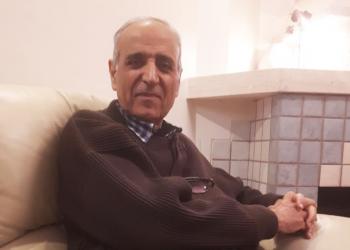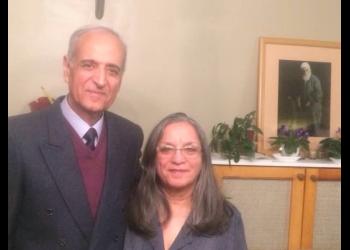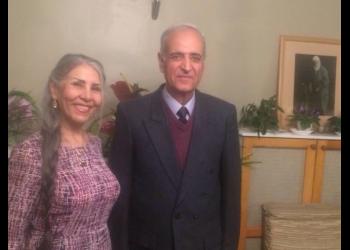Behrooz Tavakkoli Completes 10 Year Prison Sentence
Behrooz Tavakkoli, one of the seven members of the former leadership group of the Bahá’ís in Iran who were imprisoned due to religious beliefs, has completed his unjust 10-year prison sentence.
Mr. Tavakkoli is the third member of the former ad-hoc group known as “the Yaran”, or the Friends, to leave prison after the completion of his sentence. He and five other members of the Yaran were arrested in May 2008 after an early morning raid on their homes. Another member, Mrs. Mahvash Sabet, was arrested two months earlier, in March 2008.
Although three have been released, four other members remain in prison. This is while the persecution of the Bahá’ís in Iran continues unabated.
“Mr. Tavakkoli now returns home after 10 years, back to a society in which his co-religionists still face relentless persecution because of their beliefs,” said Ms. Diane Ala’i, the Representative of the Bahá’í International Community to the United Nations in Geneva.
The constant threat of raids, arrests, detention or imprisonment are among the main features of Iran’s persecution of Bahá’ís today. In recent months, arrests of have been intensifying in cities such as Kermanshah, Birjand and Rasht, and today there are currently approximately one-hundred Bahá’ís in prison, all of whom are held only because of their religious beliefs.
“Although the Bahá’í International Community welcomes the release of Mr. Tavakkoli, we are distressed at the continuing persecution of the Bahá’ís in Iran which has not decreased and, in fact, has even worsened.”
In recent years, economic persecution against the Bahá’ís has escalated in what the Bahá’í International Community has called, in an open letter to President Rouhani, an “economic apartheid against a segment of Iran’s population”. In addition to the categorical exclusion of Bahá’ís from employment in the public sector as well as various professions in the private sector, since 2013, hundreds of Bahá’í-owned shops and businesses have been sealed by the authorities, depriving scores of families of an income.
In the most recent example, dozens of Bahá’í shop were sealed by the authorities because the owners had closed their shops in observance of Bahá’í holy days.
“Although President Hassan Rouhani has made promises regarding citizenship rights and equality and justice for all Iranians, his statements have not so far been actualized. The Bahá’ís in Iran continue to face daily pressures aimed at eradicating them as a viable entity in their own country,” added Ms. Ala’i.
Mr. Tavakkoli himself has experienced discrimination for being a Bahá’í throughout his life. He is a former social worker who lost his government job in the early 1980s because of his beliefs in the Bahá’í Faith.
He studied psychology in university and then completed two years of service in the army, where he was a lieutenant. He later took additional training and specialized in the care of the physically and mentally disabled, working in this position until his expulsion.
Prior to his current imprisonment, he also experienced intermittent detainment and harassment and, in 2005, was jailed for four months without charge, spending most of the time in solitary confinement
Aside from Mr. Tavakkoli, Mrs. Mahvash Sabet and Mrs. Fariba Kamalabadi have also been released from prison. The four remaining members of the Yaran who are expected to complete their sentences in the coming months include, Mr. Jamaloddin Khanjani, 84; Mr. Afif Naeimi, 56; Mr. Saeid Rezai, 60; and Mr. Vahid Tizfahm, 44.
Background on the Yaran
The Yaran, now disbanded, were formed with the full knowledge and approval of the Iranian authorities after formal Bahá’í institutions were declared illegal in Iran in the 1980s. Their role was to see to the minimum spiritual and material needs of Iran's Bahá’í community.
Even so, the seven were imprisoned for some twenty months before receiving their charges and were subjected to appalling treatment and conditions in prison. Their trial began on 12 January 2010 behind closed doors.
Following six brief sessions characterized by a lack of due legal process, the trial ended on 14 June 2010. The government originally sentenced them to 20 years’ imprisonment, which was later reduced to 10 years after a delayed application of the 2013 penal code to their case.
Following the first session of their trial, their lawyer and Nobel Peace Prize laureate, Ms. Shirin Ebadi, who had hardly one hour’s access to her defendants, explained that she had read the dossier of charges against them and found no proof to sustain their criminal charges.
“I am the head of the legal team representing these seven Bahá’ís. I have studied their files thoroughly,” said Ms. Ebadi. “There is not a shred of evidence for the charges leveled against them.”
Their arrest and imprisonment prompted an international outcry for their release by the United Nations (UN), governments and media around the world. In 2010, the UN High Commissioner for Human Rights, Ms. Navi Pillay, expressed “deep concern that” their “trials did not meet the requirements of due process and fair trial” and in a 2014 report by the UN Secretary-General Ban Ki-Moon, he urged “their unconditional release” from prison.





